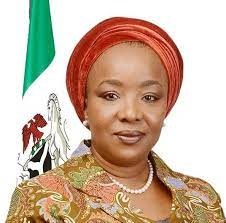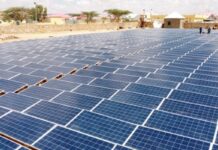By AKOR SYLVESTER-Abuja
As part of its efforts to tackle the menace of climate change in the country, federal government yesterday launched the Nigeria Energy Calculator 2050 (NECAL 2050) and charged stakeholders to braze up in the effort to meet the target spelt out in the agreement jointly signed by Nigeria and the United Kingdom.
The minister of state for Environment, Sharon Ikeazor at the launch of NECAL 2050 in Abuja yesterday, said Nigeria is committed to observing all the climate change protocols in order to tackle the menace .
She expressed optimism that the country would together with other African countries meet the target on dealing with climate change in the countries.
The minister further commended the administration of president Muhammadu Buhari for setting the space for the programme, while thanking the UK government for partnering Nigeria in the project.
“It gives me great pleasure to be chair of this launch and part of today’s event as I recall the MoU jointly signed by the Energy Commission of Nigeria ECN, Department of Climate Change of Federal Ministry of Environment and United Kingdom at the premises of the British High Commission in Abuja on the 23rd June 2020 to initiate the commencement of the Project on the development of the NECAL as an updated version to address climate change in Nigeria.
“The 2050 calculator was originally developed by the UK’s Department for Business,Energy and Industrial Strategy to help the UK Government plan their county’s low carbon transition in an evidence based way. Versions of the 2050 calculator are now being used in over 30 Countries around the world and Nigeria is one of the 10 counties supported through the UK Government’s International Climate Finance(ICF) programme to develop a calculator.
“This work is led by the Energy Commission of Nigeria and the resulting Nigerian Energy Calculator was one of the tools used to inform the country’s NDC and its Sustainable Energy for All Action Agenda (Vision 2030) .
“Distinguished Ladies and Gentlemen, Today, as we gather to launch the 2nd Edition of the Nigeria Energy Calculator NECAL 2050, I am more elated knowing that the completion of this Policy Tool could not have come at a better time than now.
“As you may recall, the commitment of the government of President Muhammadu Buhari to global climate protocols and recent declaration at the UNFCCC Conference of Parties in Glasgow on meeting Net zero emissions by 2060.
“Towards this end, The Ministry as the national coordinating body of climate activities will leverage on this Tool for policy and decision making for the implementation of Nigeria’s long-term strategy for climate change under the Paris Agreement, as well as identify realistic solutions towards supporting the implementation of Nigeria’s NDCs.
“May I express our appreciation to the British High Commission in Nigeria for the support provided in enabling this tripartite engagement with the UK Department of Business, Energy & Industrial Strategy (BEIS), Federal Ministry of Environment and the Energy Commission of Nigeria. I wish to thank the Consortium from UK BEIS – Imperial College , Ricardo , Mott McDonald and Climact for the technical support provided for this Project.
“The contributions of the National Steering Committee, Technical Working Group and participatory roles of all stakeholders towards the successful completion of this Project is duly acknowledged.
“On this note. I urge all to continue to further strengthen needed engagements and capacity that will ensure inclusion of all relevant stakeholders in the utilisation of the NECAL 2050 to support transformative climate actions.
“Ladies & Gentlemen, with the National Climate Change Act in place to provide needed legal framework for the implementation of climate change policies and strategies, I look forward to the utilisation of this Policy Tool to address and support the development of Nigeria’s Long-term low-emissions towards meeting the Net Zero commitment by 2060”.

























